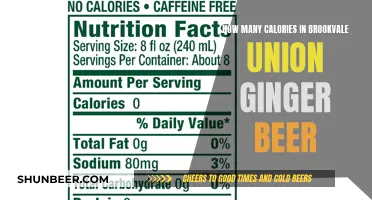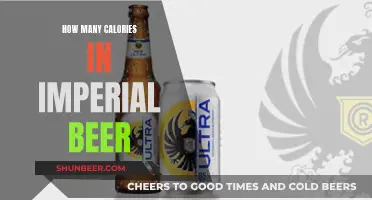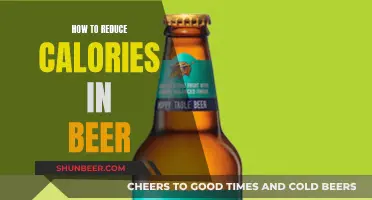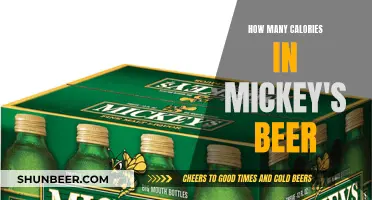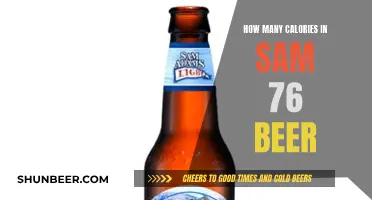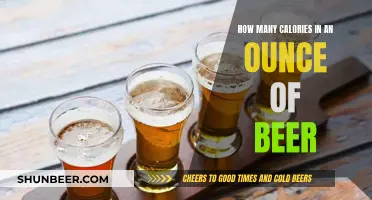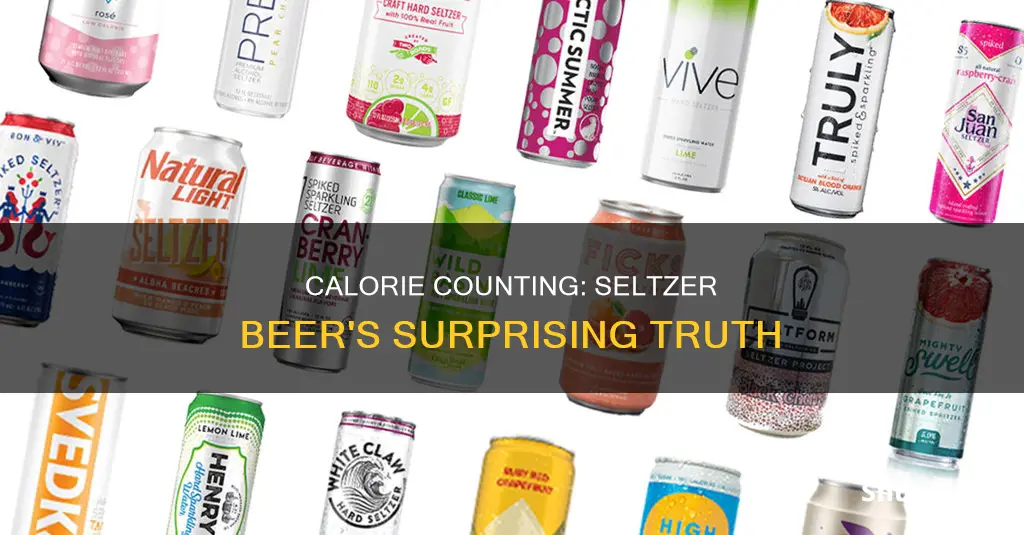
Hard seltzers have become increasingly popular in recent years, with their low-calorie, low-carb, and low-sugar content. But how do they compare to beer when it comes to calorie count? A typical 12-ounce can of hard seltzer contains around 100 calories, 2 grams of sugar or less, and 2 grams of carbs, with an alcohol content of about 5% ABV. In contrast, a regular 12-ounce beer has approximately 150 calories, 13 grams of carbs, and no sugar, with a similar alcohol content of around 5% ABV. Light beers, on the other hand, have around 100 calories, 6 grams of carbs, and no sugar, with an alcohol content of about 4.2% ABV. So, while hard seltzers typically have fewer calories than regular beer, they are comparable to light beers in terms of calorie content. However, it's important to note that the calorie count can vary depending on the brand and type of hard seltzer or beer.
| Characteristics | Values |
|---|---|
| Calories | 100 calories per 12-ounce can |
| Carbohydrates | 2 grams of carbs |
| Alcohol by volume | 5% ABV |
| Sugar | 2 grams of sugar |
| Flavours | Mango, melon basil, lime, black cherry, grapefruit, pineapple pomelo, raspberry lime, blackberry hibiscus, pear elderflower, cranberry, clementine hibiscus, lemon lime, prickly pear, coconut, classic blackberry, cranberry, grapefruit, etc. |
What You'll Learn

Hard seltzers have fewer calories than beer
Hard seltzers are often marketed as a "healthy" alternative to beer and other alcoholic beverages due to their low-calorie content. They are made with brewed cane sugar and/or malted rice, with carbonated water and flavorings added, resulting in a refreshing and low-calorie drink. The alcohol in hard seltzers is usually made from a neutral grain spirit or a fermented fruit base, leaving no residual sugar. This makes hard seltzers a low-sugar or low-calorie option, with a similar ABV to beer.
However, it's important to note that hard seltzers are still alcoholic beverages, and excessive consumption can lead to health risks. Additionally, the easy drinkability of hard seltzers may lead to overconsumption, as they don't provide the same sense of fullness that beer or wine might. It's always important to consume alcohol in moderation and to stay hydrated by drinking water alongside alcoholic beverages.
When comparing hard seltzers to beer, it's clear that hard seltzers have fewer calories. However, it's worth considering other factors such as carbohydrate and sugar content when making a decision between the two. Ultimately, the healthiest option is to consume alcohol in moderation or not at all.
Calories in Ballast Point Sculpin IPA: Nutritional Breakdown
You may want to see also

Hard seltzers are often low in sugar
The low sugar content of hard seltzers is due to the way they are produced. They are typically made with brewed cane sugar and/or malted rice, with carbonated water and flavourings added. The alcohol in hard seltzers is usually made from a neutral grain spirit or a fermented fruit base, which leaves no residual sugar. As a result, hard seltzers are often low in sugar and calories while having a similar alcohol by volume (ABV) to beer.
Hard seltzers have gained popularity for several reasons. They are often gluten-free, making them a good option for those with gluten sensitivities. They are also lower in calories and carbohydrates than many beers, wines, and cocktails. A typical 12-ounce can of hard seltzer has around 100 calories, compared to 150 calories in a regular 12-ounce beer.
However, it's important to note that hard seltzers are not necessarily a "healthy" option. While they may be lower in calories and sugar, they are still alcoholic beverages, and excessive alcohol consumption can lead to both immediate and long-term health risks. Additionally, the easy drinkability of hard seltzers can lead to overconsumption, as they don't make you feel full like beer can.
Wheat Beer Calories: What's the Count?
You may want to see also

Hard seltzers are usually gluten-free
Hard seltzers are usually lower in calories than beer. A typical 12-ounce can of hard seltzer contains around 100 calories, while a beer of a similar ABV can range from 150 to 200 calories. Light beers have a similar calorie count to hard seltzers, with around 100 calories per 12-ounce can. However, hard seltzers are higher in alcohol content than light beers, with an ABV of around 5% compared to 4.2% for light beer.
The low-calorie count of hard seltzers is one of the main reasons for their popularity. They are often marketed as a "healthy" alternative to beer or cocktails. However, it is important to remember that hard seltzers are still alcoholic beverages, and excessive consumption of alcohol can lead to health risks.
Hard seltzers come in a variety of flavours, such as grapefruit, black cherry, lime, and more inventive combinations like Pineapple Pomelo and Pear Elderflower. The range of flavours, along with their low-calorie count, makes hard seltzers a refreshing and appealing choice for consumers.
Some popular brands of gluten-free hard seltzers include White Claw, Truly, Bon & Viv, Corona, and Wild Basin Boozy Sparkling Water. These brands offer a variety of flavours and are known for their commitment to authenticity and natural ingredients.
Flat Tire Beer: Calorie Count and Nutrition Facts
You may want to see also

Hard seltzers are not hydrating
Hard seltzers have gained a reputation for being a healthier alternative to other alcoholic drinks, such as beer. They are often marketed as a refreshing, low-calorie option, but contrary to popular belief, they are not hydrating. In fact, no alcoholic beverage is a good choice for hydration.
Alcohol is a Diuretic
Alcoholic beverages, including hard seltzers, are diuretics, which means they increase urination. This leads to a loss of fluids in the body and can result in dehydration. The more you drink, the more you will need to urinate, and the more fluids you will lose. This is why it is common to experience dehydration and increased thirst after a night of drinking.
Artificial Sweeteners
Hard seltzers often contain artificial sweeteners, which can cause digestive issues, leading to further dehydration. The combination of alcohol and artificial sweeteners can be particularly dehydrating, and the carbonation in hard seltzers may also contribute to this effect.
Staying Hydrated While Drinking Hard Seltzers
If you choose to consume hard seltzers, it is important to prioritize hydration. Drinking water alongside alcoholic beverages can help prevent dehydration and reduce the risk of a hangover. Aim to drink one glass of water for every hard seltzer, and consider snacking on hydrating foods, such as fruits like mango, pomegranate, or cucumbers.
Additionally, be mindful of your consumption. Hard seltzers are often marketed as a healthier option, and their refreshing taste can make it easy to drink more than intended. However, they still contain alcohol and should be treated like any other alcoholic beverage. Enjoy them in moderation, and always drink responsibly.
In Conclusion
While hard seltzers have their perks, hydration is not one of them. They do not provide the same hydrating benefits as regular water or even non-alcoholic seltzers. So, if you're looking to stay hydrated, stick to water or other non-alcoholic beverages.
Calorie Count in Molson Canadian Light Beer Revealed
You may want to see also

Hard seltzers are easy to drink, so it's easy to have too many
Hard seltzers are often marketed as a healthier alternative to beer and cocktails. They typically contain fewer calories and carbohydrates, and are gluten-free. A 12-ounce can of hard seltzer usually has around 100 calories, 2 grams of sugar, and 2 grams of carbohydrates, compared to a regular 12-ounce beer, which has an average of 150 calories, 13 grams of carbohydrates, and no sugar.
However, hard seltzers are just as easy to drink as non-alcoholic seltzers, and this can be a problem. Because they go down so smoothly, it's easy to lose track of how much you're drinking. You may find yourself drinking more than you usually would, which can lead to a host of problems.
Firstly, while hard seltzer is low in calories, those calories are empty. This means that they provide no nutritional value to your body. Secondly, hard seltzer, like all alcoholic beverages, can lead to immediate and long-term health risks if consumed in excess. Alcohol is seven calories per gram, and those are empty calories as well. Excessive drinking accounts for a significant number of deaths in the US every year, and binge drinking is responsible for over half of those deaths. Long-term overuse of alcohol is linked to several health conditions, including heart disease, stroke, high blood pressure, cancer, and liver disease.
Additionally, hard seltzer does not hydrate you, despite being made with carbonated water. Alcohol is a diuretic, which means it promotes water loss through urine. This can lead to dehydration, especially if you're not drinking enough water alongside your alcoholic beverage.
So, while hard seltzer may be a relatively healthier option compared to beer or cocktails, it's important to remember that it's still alcohol. It should be consumed in moderation, just like any other alcoholic drink. Enjoy them in moderation—stick to one a day if you're a woman, or two if you're a man.
Beck's Blue Beer: Calorie Count for Health-Conscious Drinkers
You may want to see also
Frequently asked questions
A typical 12-ounce beer has 140 calories, which is the same as a can of Coke. Some beers have twice as many calories.
Most light beers have about 100 calories.
Heavy hitters like regular IPAs, double or imperial IPAs, and Belgian-style Trippels pack 200 to 300 calories.
Most hard seltzers have fewer than 100 calories in a 330ml can.
Yes, hard seltzers typically have fewer calories than beer.


